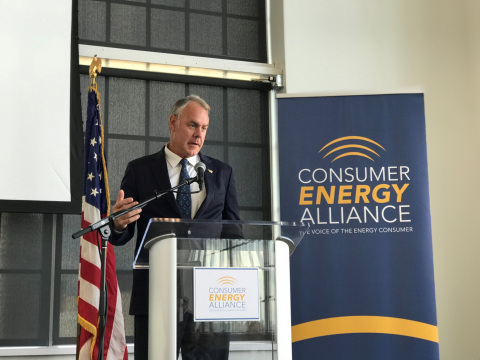
U.S. Secretary of the Interior Ryan Zinke spoke at an energy and manufacturing summit on Sept. 28 hosted by Consumer Energy Alliance (CEA) in Pittsburgh where he highlighted the positive impact domestic energy production and development in the Marcellus and Utica formations have on the U.S. economy.
Zinke was joined by policymakers, business and labor leaders who discussed how the Marcellus and Utica shale formations have driven growth in natural gas production; lowered manufacturing, industrial and commercial costs; increased job growth, tax revenue and economic opportunities; and with pipeline expansion, helped better protect the environment in Pennsylvania and also nationwide.
Zinke also discussed employing an all-of-the-above energy strategy.
“President Trump has been clear: America has to be energy dominant,” Zinke said. “We have re-lit the pilot light of American energy under this President. We are incorporating industry innovation, best science and best practices to improve reliability, safety and environmental stewardship. Our energy strategy is ‘all-of-the-above,’ leveraging every source of energy to take our nation forward. I am bullish about America’s energy future.”
The event included presentations by Alan Armstrong, president and CEO of Williams; Dave Spigelmyer, president of the Marcellus Shale Coalition; Darrin Kelly, president of the Allegheny-Fayette County Central Labor Council; Bruce McKay, senior policy advisor of Federal Affairs for Dominion; and Kevin Sunday, director of government affairs for the Pennsylvania Chamber of Business and Industry, among others.
Mike Butler, executive director of CEA-Mid Atlantic, discussed a recent CEA analysis that showed that Pennsylvanians saved approximately $30.5 billion from 2006 to 2016 in natural gas costs and noted that this was largely due to increased production and new technologies.
“Developing the Marcellus and Utica shale plays and improving their energy infrastructure are must-haves for ensuring our energy security and diversity and increasing access to more affordable, reliable energy,” Butler said. “Both will help lower energy costs for cash-strapped families and businesses and create more economic opportunities by providing greater incentive for manufacturers and businesses to set up shop and create jobs.”
Armstrong of Williams said he sees a tremendous growth opportunity in the region. In fact, Williams now has more than $14 billion of assets serving the Marcellus and Utica resource base after investing heavily in the area over the past 10 years.
“We continue to expand our premier gathering and processing network, and recently completed the $2.7 billion Atlantic Sunrise Pipeline, a vital takeaway pipeline that will connect Northeast Pennsylvania’s robust natural gas supply with important markets,” Armstrong added.
Dominion’s McKay explained how Dominion’s local work is having a positive effect regionally on households and businesses.
“The billions of dollars in midstream investments being made by Dominion Energy to help get natural gas to hungry markets at home and abroad ripple through the region’s economy providing jobs, local tax revenues and opportunities for many small and midsized businesses,” McKay said. “A prime example is the $400 million worth of pipe made by Pennsylvania workers at Durabond Industries for the Atlantic Coast Pipeline.”